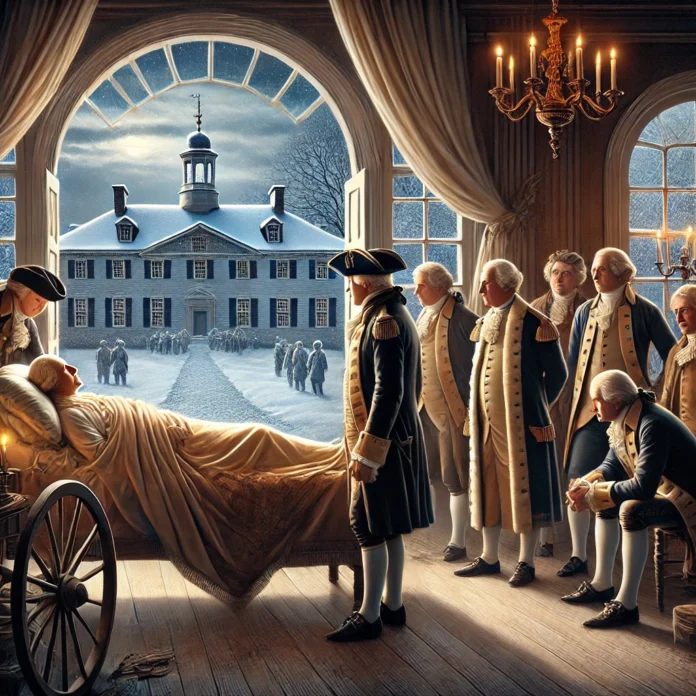Two hundred twenty-five years ago today (December 14, 1799), George Washington, the first President of the United States and a pivotal figure in the American Revolution, passed away at his Mount Vernon estate in Virginia. He was 67 years old. Washington’s death marked the end of a remarkable life that helped lay the foundation for a new nation.
The Final Days of a Founding Father
In the days leading up to his death, Washington remained active, overseeing operations at Mount Vernon despite inclement weather. On December 12, after a long ride in freezing rain, he developed a sore throat and symptoms that would soon worsen. By December 13, his condition deteriorated rapidly, leading to difficulty breathing and intense discomfort. Aware of his declining health, Washington calmly prepared for the end, providing instructions for his burial and refusing invasive treatments. His final words reportedly were, “It is well.”
The medical care Washington received in his final hours has since been scrutinized. At the time, bloodletting was a common practice, and Washington’s doctors drained an estimated 40% of his blood—an act that likely hastened his death. This method, combined with outdated medical knowledge, highlights the challenges of healthcare in the 18th century.
Washington’s Legacy
Washington’s death sent ripples through the young nation. Tributes poured in from all corners of the United States and abroad. He was eulogized as the “Father of His Country,” a title reflecting his indispensable role in achieving independence and guiding the fledgling republic. His leadership during the Revolutionary War, followed by his steady hand as the first President under the Constitution, set enduring precedents for the presidency.
In his two terms as President (1789–1797), Washington championed neutrality in foreign conflicts, presided over the creation of the national bank, and oversaw the drafting of the Bill of Rights. His decision to voluntarily relinquish power after two terms became a cornerstone of democratic governance.
A Man of Complexity
Though revered, Washington’s legacy is not without complexity. He was a landowner and slaveholder, and his personal and political actions regarding slavery remain a subject of debate. While he stipulated in his will that his enslaved people be freed upon his wife Martha’s death, this act did not absolve the systemic injustice of his time.
Reflection on Washington’s Enduring Influence
Washington’s life and death offer lessons in leadership, humility, and the challenges of nation-building. His farewell address, warning against political factionalism and foreign entanglements, continues to resonate in contemporary political discourse.
As we remember Washington on this solemn anniversary, we are reminded of the profound impact individuals can have on the course of history. His contributions are immortalized not only in monuments and currency but in the principles and institutions that underpin American democracy.
Let us reflect on the legacy of a leader who guided a young nation through uncharted waters, leaving a blueprint for future generations to follow.




